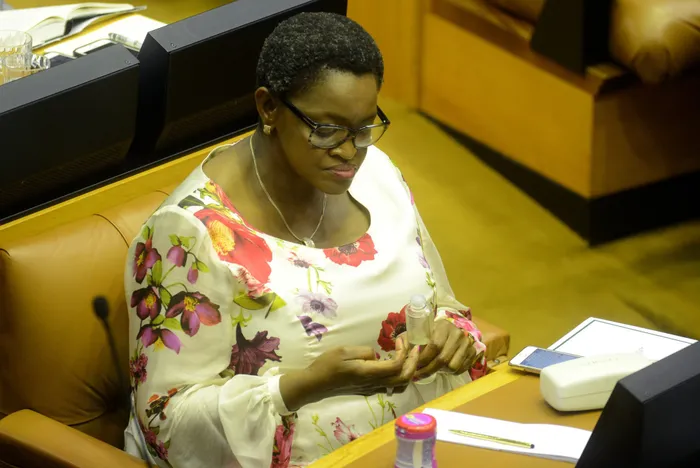
Former Social Development Minister, Bathabile Dlamini found guilty of perjury in relation to a social grants crisis in 2017. PIC: Ayanda Ndamane: African News Agency/ANA
The Black Sash Trust has welcomed the court finding former Minister Bathabile Dlamini guilty of perjury in relation to her role in the social grants crisis in 2017.
The Johannesburg magistrate's court found the former Minister of Social Development perjured herself during her testimony under oath before an inquiry established by the Constitutional Court to determine her role in the social grants crisis when millions of beneficiaries were put at risk.
There was no plan to continue paying social grants when an invalid contract with Cash Paymaster Services (CPS) came to an end.
The Trust said the decision demonstrated that public officials had a duty to act ethically and must be held to account when they did not.
Executive director of the Black Sash Trust, Rachel Bukasa, said: "It's high time that the South African judiciary starts to deliver on the promise that no one is above the law. Cases such as this will go a long way in ensuring that people start to believe that we are all equal before the law".
Cash Paymaster administered the payment of social grants after it entered into a multi-billion rand contract with the South African Social Security Agency (Sassa) in 2012. However, the contract was deemed unlawful by the Constitutional Court in 2014 because proper procurement policies were not followed.
Dlamini approached the court at the 11th hour seeking an extension of the contract and the contract was extended to 2017 to allegedly prevent chaos in the distribution of social grants.The Black Sash Trust brought a Constitutional Court application against Dlamini, in which Freedom Under Law intervened.
The matter resulted in a set of orders from the Court, among them that an inquiry be established to determine Dlamini's role and responsibility in the social grants crisis.
The Centre for Applied Legal Studies (CALS) represented the Black Sash Trust at the inquiry and presented evidence that Dlamini had failed in her duties and had misled the Court to avoid being held to account for these failures.
A report by the chairperson of the inquiry, Judge Bernard Ngoepe, later described Dlamini as an "evasive witness who failed to disclose" information to the Court for fear of being held liable in her personal capacity.
The judge found that the reason Dlamini did not disclose some information was that she was afraid that she would be blamed for the crisis.
The court later ordered that Dlamini be held personally liable and that she herself pay a portion of the legal costs of the proceedings.
The court also found Dlamini's conduct to have been “reckless and grossly negligent”.
It also noted the inquiry’s report which suggested that some of Dlamini’s evidence under oath in the affidavits and orally before the Inquiry was false” .
On Wednesday, Magistrate Betty Khumalo found that Dlamini had “knowingly and intentionally disposed of false evidence”.
CALS welcomed the decision. “It highlights the duty placed on our public officials to act ethically and in the public interest at all times,” said attorney, Ariella Scher.
Scher said even those that occupied the highest offices must be held to account for their actions. "Perjury is not a victimless crime, especially for sitting cabinet ministers. In this case, Dlamini’s dishonesty contributed to an ongoing crisis in the social grants system that threatened the millions of beneficiaries who rely on it every month.”
